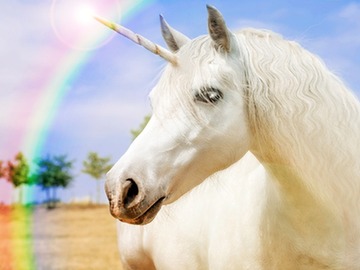Update: This word was added in March 2018.
The word unicorn, from a Latin phrase meaning "having one horn," dates back to the 13th century. But the mythological creature we call a unicorn, now a ubiquitous, rainbow-maned kitsch icon, is older than the name: it appears in early Mesopotamian art and Medieval tapestries, in European crests, and in ancient myths of India and China. Over the centuries, unicorn has been used to describe that one-horned horse, but it's also been applied to the one-horned rhinoceros, the narwhal, a Scottish coin, several plants, and a cannon—among other things.

It's not clear when English speakers decided that a combo of "rare and highly desirable" was enough to earn unicorn status
Now unicorn has a new metaphorical meaning: it's a start-up valued at a minimum of one billion dollars.
You can thank venture capitalist Aileen Lee for the new meaning; she used it in a November 2013 article in TechCruch and the use looks like it might be here to stay. The article notes that unicorn here diverges from its original referent in having actual existence, and "means something extremely rare, and magical."
This type of extension of the word is not new. As Ben Zimmer noted in his Wall Street Journal article on Lee's use last year, data scientists have also been called "unicorns" in recent years, as tech recruiters consider them similarly rare and desirable. Various entries on Urban Dictionary note that the word also applies to very desirable romantic and sexual partners who are either rare, or, in a more traditional use of the word, found only in fantasy.
An earlier metaphorical use in our files also preserves the mythical status of the unicorn:
A brokered convention, with party leaders wheeling and dealing through multiple ballots, may be the modern political equivalent of the unicorn: long sought but never actually sighted. — Walter Shapiro, Time, 28 Dec. 1987
It's not clear when English speakers decided that a combo of "rare and highly desirable" (or "rare and magical") was enough to earn someone or something unicorn status, but we'd venture some capital that the rainbow manes had something to do with the transition.




